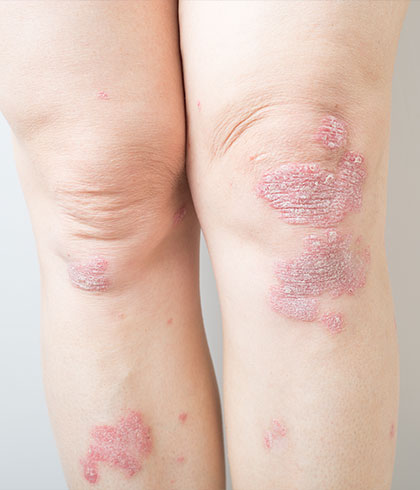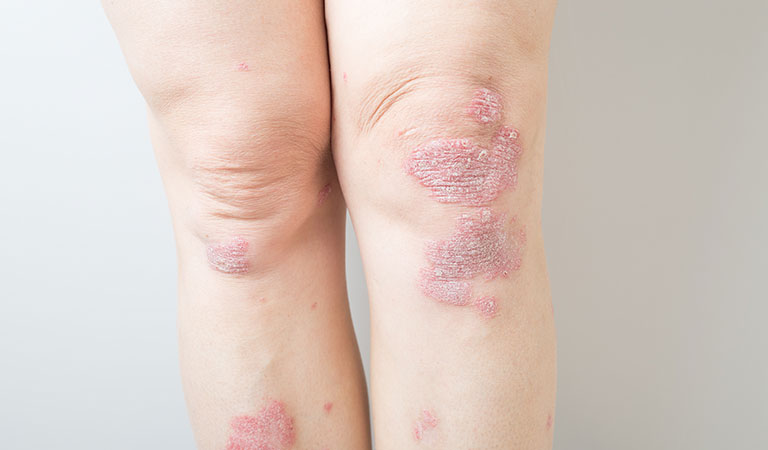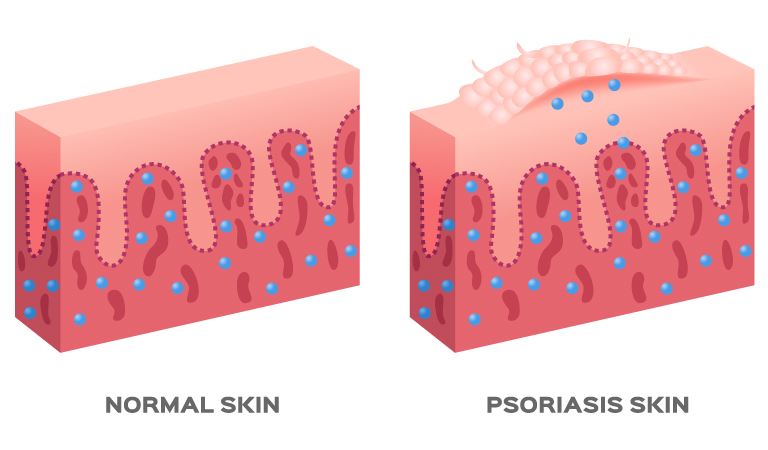

What is Psoriasis and Treatment for Psoriasis-Psoriatic Arthritis
Psoriasis is an autoimmune skin disorder, meaning that a dysfunctional immune system is a key cause of this skin disease. An overactive immune system can cause a rapid increase in skin cell production that leads to raised, red, dry, scaly patches on the skin. Many patients even report itching, burning sensations and stings on their skin.
Psoriasis damage is more than skin deep, which means it can affect the other parts of your body. It is associated with other serious health conditions, such as diabetes, heart disease or stress and depression. If you develop a stubborn skin rash that causes discomfort, you should consult your skin doctor.
Most people with psoriasis experience skin lesions; however, severity varies from person to person. Psoriasis vulgaris is divided into six types: plaque psoriasis, scalp psoriasis, guttate psoriasis, pustular psoriasis, psoriasis in sensitive areas and nail psoriasis.
According to a research study conducted by the National Psoriasis Foundation, depression is the number one co-morbidity of psoriasis. Psoriasis has also been linked to a high risk of cardiovascular diseases, type 2 diabetes, high blood pressure, obesity and psoriatic arthritis. Psoriatic arthritis affects about 30% of people with psoriasis. The disease often appears between the age of 30 to 50 years. In many individuals, it starts about 10 years after psoriasis develops. Whereas, some people develop psoriatic arthritis first; without ever developing psoriasis.
Also read: https://www.drbatras.ae/skin-problems/psoriasis-treatment
What is Psoriatic Arthritis?
Psoriatic Arthritis (PsA) is a long-term inflammatory joint condition that occurs when the immune system attacks healthy tissue, especially where tendons and ligaments attach to bones. It commonly affects individuals with psoriasis, though joint symptoms may appear before skin issues. PsA can impact any part of the body fingertips to spine—and varies in severity, requiring timely medical evaluation and personalized care.
Psoriatic Arthritis Symptoms
Both psoriasis and psoriatic arthritis are chronic diseases that can get worse over a period of time. In both psoriasis and psoriatic arthritis, disease flare ups may alternate with periods of remission.
Psoriatic arthritis can affect joints on just one or on both sides of the body. The signs and symptoms of psoriatic arthritis often resemble those of rheumatoid arthritis. Both diseases cause joints to become painful, swollen and the affected area feels warm. However, psoriatic arthritis is more likely to cause:
- Swollen fingers and toes: Psoriatic arthritis can cause painful, sausage-like swollen fingers and toes. Individuals may also develop swelling and deformities in their hands and feet.
- Foot pain: Psoriatic arthritis can also cause pain at the points where tendons and ligaments are attached to the bones — especially at the back of your heel (achilles tendinitis) or in the sole of your foot (plantar fasciitis).
- Lower back pain symptoms: Some people develop a health condition called spondylitis as a result of psoriatic arthritis. Spondylitis mainly causes inflammation of the joints between the vertebrae of your spine and between your spine and pelvis (sacroiliitis).
Many psoriasis and psoriatic arthritis patients get relief with complementary and integrative therapies that focus on preventive care and pain management. So, psoriasis treatment should focus on controlling skin infection in the affected joints and preventing joint pain and disability.
Treatment for Psoriasis and Psoriatic Arthritis
- Protect your joints: Changing the way you carry out everyday tasks can make a tremendous difference in how you feel. For example, you can avoid straining your finger joints by using gadgets, such as jar openers to twist open the lids. You can push open the doors with the whole body, instead of just using the fingers to avoid strain. Individuals with psoriatic arthritis should avoid lifting heavy objects.
- Maintain a healthy body weight: Maintaining a healthy body weight places less strain on your joints, leading to reduced pain with increased energy and mobility. Losing weight can also help your medications work better. Some psoriatic arthritis medications are less effective in people who have a body mass index of 25.0 to 29.9 (overweight). The best way to increase nutrients while limiting calories is to eat more — fruits, vegetables and whole grains.
- Include natural source of Vitamin D: Sunshine may help relieve some symptoms of psoriasis. Put on sunscreen with an SPF of at least 30 and spend 10 to 15 minutes in the sun. Consider, spending time outside in the morning, when the sun is less intense.
- Use natural remedies for psoriasis: Aloe vera is a plant known for its skin-healing properties. Creams or gels with aloe vera can help reduce itching, inflammation, flaking, and redness of psoriasis disease. Its application can smoothen the affected area. Additionally, coconut oil is filled with healthy fats that boost skin health. Turmeric is also a natural herb well known for its anti-inflammatory and antioxidant properties. Try to incorporate more turmeric into your daily cooking.
- Exercise regularly: Exercise can help keep your joints flexible and your muscles strong. Types of exercises that are less stressful on joints, include swimming and walking.
- Stop smoking: Smoking is associated with a higher risk of developing more severe psoriasis.
- Limit alcohol use: Alcohol can increase your risk of psoriasis, decrease the effectiveness of psoriasis treatment and increase side-effects from some conventional medications.
- Pace yourself: Battling pain and skin inflammation can leave you feeling exhausted. The key isn't to stop being active, but to rest before you become too tired. Divide exercise or work activities into short segments. Find time to relax several times, throughout the day.
According to a research study conducted by the National Psoriasis Foundation, related comorbidities of psoriatic arthritis include, cardiovascular diseases, metabolic syndrome, obesity, hypertension, dyslipidemia (consistent high levels of cholesterol and other lipids), type 2 diabetes, inflammatory bowel disease and kidney disease.
Early diagnosis is important to prevent long-term functional disability and to ensure optimal management of psoriatic arthritis and its key comorbidities. The psoriasis treatment can help to stop the skin disease progression, reduce pain, protect joints and enhance their movement.
Read about the psoriasis treatment approach at Dr Batra’s™ https://www.drbatras.ae/skin-problems/psoriasis-treatment

Homeopathic Treatment for Psoriasis
Conventional modes of treatment are based on immunosuppressant (supress the autoimmune reaction in body). They may clear the skin in a few days or weeks, but psoriasis would recur as soon as the effect of the medicine gets over. Homeopathic treatment works very efficiently for people suffering from psoriatic arthritis. These homeopathic remedies help control pain, stiffness and swelling by focusing on the underlying root-cause of the problem. Constitutional homeopathic remedies provide long-term relief, are non-addictive and also eliminate the risk of recurrence.
Homoeopathy helps to stimulate the body's natural healing capacity and restores the strayed immunity, back to normalcy. Homeopathic medicines treat psoriatic arthritis gently without damaging the vital organs unlike conventional medicine which is known to damage liver, kidney or gallbladder.
As psoriasis is an autoimmune skin disorder, homeopathy helps to build immunity, managing psoriasis effectively. Homeopathic medications take into account triggering factors, such as infections and stress that can flare up the psoriasis disease. Psoriasis treatment in homeopathy also controls the further progression of the disease without any side-effects.
Additionally, to confirm the diagnosis, Dr Batra's™ has introduced India’s first 3D imaging device. The 3D device can show your response to a treatment and the improvement in your skin, much before it is visible to the naked eye. Moreover, Dr Batra’s™ has achieved 94.3% success rate in treating skin diseases, as authenticated by the American Quality Accessors. Book an appointment with us at: https://www.drbatras.ae/book-an-appointment and let our homeopathic doctor guide you towards the most effective psoriasis treatment.
Key Takeaways
- Psoriasis is an autoimmune skin disorder that causes red, scaly patches and can affect other parts of the body, leading to serious health issues like diabetes and heart disease.
- Psoriatic arthritis is a chronic joint disease linked to psoriasis, causing painful, swollen joints and may appear before or after skin symptoms.
- Treatment includes lifestyle changes like maintaining a healthy weight, using natural remedies, and exercising regularly to manage symptoms and improve joint function.
- Homeopathic treatments focus on building immunity and addressing the root causes of psoriasis and psoriatic arthritis without harmful side effects.
- Early diagnosis and treatment are crucial to prevent long-term disability and manage related health conditions effectively.
https://www.drbatras.ae/get-rid-of-psoriasis-scalp-with-homeopathy - Also Read
https://www.drbatras.ae/skin-problems/psoriasis-treatment - Also Read
https://www.drbatras.ae/homeopathic-medicine-is-best-for-psoriasis - Also Read
https://www.drbatras.ae/skin-problems/psoriasis-treatment - Also Read
https://www.drbatras.ae/homeopathic-medicine-is-best-for-psoriasis - Also Read

